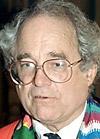The Rev. William Sloane Coffin made his mark as activist, rebel

The Rev. William Sloane Coffin Jr., a Presbyterian clergyman and former Yale University chaplain whose early activism against the Vietnam War brought him international notoriety during a lifelong career of civil disobedience, died Wednesday at his home in Strafford, Vt., of congestive heart failure. He was 81.
From the moment in 1958 when the Rev. Coffin roared onto Yale's campus atop his motorcycle, he signaled that his presence would mean a distinctly radical approach to the social, political and moral upheaval that defined the next decade.
The Rev. Coffin called himself a "Christian revolutionary" and believed that his outspoken activism sprang from the principles of his faith.
Cartoonist Garry Trudeau, a former Yale student, caricatured the Rev. Coffin as a long-running, ultraliberal character — the Rev. Scot Sloan — in his "Doonesbury" strip.
"Without him," Trudeau once said of the Rev. Coffin, "the very air would have lost its charge. With him, we were changed forever."
The Rev. Coffin's 18-year tenure at Yale encompassed the civil-rights struggle and the Vietnam War, each of which he confronted in bold and daring fashion.
He was arrested in Alabama in 1961 while participating in the interracial Freedom Riders movement that challenged segregationist laws. He later was arrested in Baltimore and St. Augustine, Fla.
While his protests against racial segregation made news, his activities as a vocal and compelling critic of the Vietnam War made him a celebrity. As early as 1965, he was convinced that the U.S. military presence in Vietnam was illegal and immoral.
"It's true that we're fighting Communists," he said at the time. "But it is more profound to say that we have been intervening in another country's civil war. The war is being waged with unbelievable cruelty and in a fashion so out of character with American instincts of decency that it is seriously undermining them."
The Rev. Coffin offered men who refused to obey the draft the sanctuary of his Yale chapel in New Haven, Conn., an act that ushered one of the country's leading institutions of higher education into the debate about the war.
On Oct. 16, 1967, the Rev. Coffin and Dr. Benjamin Spock led a demonstration in Boston at which nearly 1,000 men handed over draft cards. After the rally, dubbed "Call to Resist Illegitimate Authority," the Rev. Coffin helped present the draft cards to the Justice Department.
He, Spock and others were convicted of conspiracy to aid and abet disobedience of the Selective Service Act. The charges were overturned or dropped during the next few years.
He also had a hand in retrieving three released U.S. prisoners of war in Hanoi in September 1972.
After resigning from Yale, he took up ministerial duties at New York's interdenominational Riverside Church.
He spoke out on issues including the environment, poverty and homelessness. He championed the termination of NATO and the dismantling of nuclear arms, saying, "We have to be meek or there will be no one to inherit the Earth."
In 1979, he was one of four prominent clergymen allowed by the new fundamentalist regime in Iran to visit Americans taken hostage from the U.S. Embassy in Tehran. He visited the hostages in December, singing carols and praying, and then returned to the United States to criticize the nation's "past sins" in Iran. This brought him much vilification for being soft on Iran's mullahs.
A handful at Riverside Church believed his globe-trotting and social-advocacy commitments distracted from his pastoral and administrative duties, but the Rev. Coffin saw no conflict.
"Every minister is given two roles: the priestly and the prophetic," he said. "The prophetic role is the disturber of the peace, to bring the minister himself, the congregation and entire social order under some judgment. If one plays a prophetic role, it's going to mitigate against his priestly role. There are going to be those who will hate him."
The Rev. Coffin, son of a prosperous furniture-store executive, was born in Manhattan, N.Y., on June 1, 1924. After his father's sudden death in 1933, he moved with his mother to California and later attended the private Phillips Academy in Andover, Mass.
He studied piano with French composer and teacher Nadia Boulanger and briefly attended Yale's music school before serving in the Army during World War II. Because of his proficiency with languages, he was a liaison officer with the French and Soviet armies.
The Rev. Coffin previously was married to Eva Rubinstein, daughter of pianist Arthur Rubinstein, and to Harriet Gibney. Both marriages ended in divorce.
A son from his first marriage, Alexander Coffin, died in a car accident in 1983.
Survivors include his third wife, Virginia Wilson "Randy" Coffin of Strafford; two children from his first marriage, David Coffin of Gloucester, Mass., and Amy Coffin of Oakland, Calif.; two stepchildren, Wil Tidman of San Francisco and Jessica Scull of Strafford; a brother; a sister; and seven grandchildren.